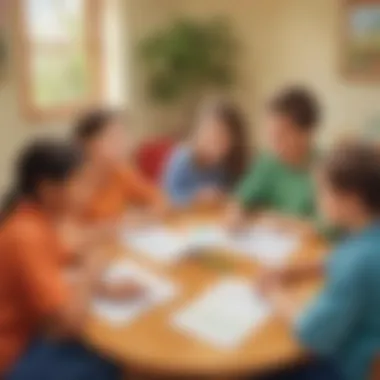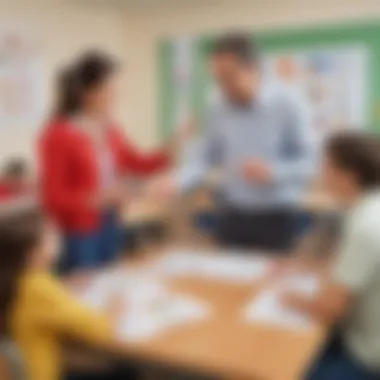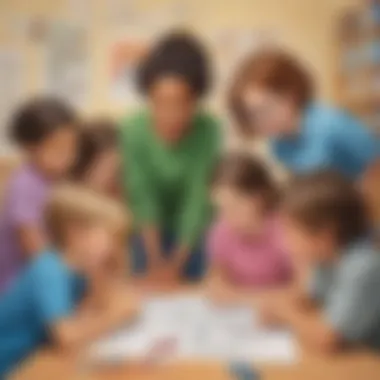Unlocking the Potential: A Guide to Enhancing Social Skills for Elementary Students


Creative Activities
Fun Quizzes
Another exciting avenue for improving social skills is through fun quizzes tailored for elementary students. Quiz topics designed specifically for young learners cover a wide array of subjects, stimulating their curiosity and expanding their knowledge base. By incorporating diverse question types, quizzes on platforms like ElemFun effectively engage children and prompt critical thinking. These interactive quizzes not only reinforce what children have learned but also cultivate a sense of achievement and satisfaction upon completing them. Knowledge reinforcement through quizzes contributes to the retention of information and helps consolidate essential social skills in practical ways.
Fact-Based Articles
Delving into fact-based articles serves as a valuable resource for nurturing social skills in elementary students. Covering a range of topics from empathy and teamwork to conflict resolution and active listening, these articles offer a wealth of information to young learners. Presenting content in an engaging and easy-to-understand manner, these articles captivate children's attention and facilitate comprehension. With additional resources such as links to related articles or external materials, students can delve deeper into specific social skills and gain a more profound understanding of the concepts discussed. By exploring diverse topics through fact-based articles, students can enhance their social awareness and interaction skills significantly.
Introduction
Understanding Social Skills
Definition of Social Skills
Social skills encompass a range of abilities that enable individuals to interact harmoniously with others in various social settings. From verbal communication to body language interpretation, social skills are instrumental in fostering positive relationships and navigating social environments effectively. In the context of this article, understanding the nuances of social skills is imperative as it forms the foundation for successful interactions among elementary students.
Role of Social Skills in Child Development
The role of social skills in child development is paramount. These skills aid children in forming connections with peers, teachers, and family members, thus shaping their social identity. By honing social skills, children can learn to express themselves confidently, resolve conflicts amicably, and engage in effective communication. Acknowledging the significance of social skills in the developmental journey of a child is crucial for building a strong social foundation.
Importance of Social Skills in Elementary Students
Enhanced Communication
Enhanced communication lies at the core of social skills development in elementary students. By honing their communication abilities, children can articulate their thoughts clearly, listen actively, and engage in meaningful dialogues. Effective communication fosters understanding, empathy, and cooperation, essential elements for building strong relationships and navigating social landscapes smoothly.
Better Relationship Building
The ability to build meaningful relationships is a vital component of social skills for elementary students. By cultivating skills such as empathy, active listening, and conflict resolution, children can forge strong interpersonal connections based on trust, respect, and understanding. Building positive relationships enhances students' social support network, boosts their self-esteem, and lays the groundwork for healthy social interactions.
Conflict Resolution
Conflict resolution is a crucial aspect of social skills that equips elementary students with the tools to address disagreements constructively. By learning effective conflict resolution strategies, children can navigate conflicts peacefully, express their emotions respectfully, and find mutually agreeable solutions. Teaching conflict resolution fosters a culture of openness, mutual respect, and collaboration, shaping students into effective problem solvers and peacemakers.
Key Social Skills for Elementary Students


In the realm of elementary education, fostering key social skills is paramount to the holistic development of young minds. Social skills play a pivotal role in shaping a child's ability to communicate effectively, build relationships harmoniously, and navigate conflicts adeptly. Understanding the importance of honing these skills at an early age sets the foundation for future success and emotional intelligence. By focusing on enhancing key social skills, such as active listening, empathy, collaboration, and conflict resolution, educators and caregivers can equip elementary students with essential tools to thrive in social settings.
Active Listening
Definition and Importance
Active listening stands as a cornerstone for effective communication and interpersonal relationships. It encompasses the art of fully engaging with a speaker, not just hearing but truly understanding their message. The essence of active listening lies in undivided attention, empathy, and non-verbal cues that signal genuine interest. Cultivating active listening skills in children fosters deeper connections, builds trust, and promotes collaborative learning environments. By incorporating active listening into educational practices, educators enhance student engagement, cognitive development, and emotional intelligence.
Tips for Developing Active Listening Skills
Developing active listening skills requires practice and nurturing. Encouraging children to maintain eye contact, paraphrase instructions, ask clarifying questions, and demonstrate empathy cultivates active listening prowess. Engaging students in reflective exercises, group discussions, and role-playing scenarios fosters a culture of attentive listening and mutual understanding. By providing consistent feedback and positive reinforcement, educators can empower children to become adept listeners, leading to improved academic performance and enriched social interactions.
Empathy
Understanding Empathy
Empathy serves as a cornerstone in cultivating healthy relationships and fostering compassion in children. It involves the ability to recognize and resonate with others' emotions, perspectives, and experiences. Understanding empathy enables children to connect on a deeper level, practice kindness, and demonstrate sensitivity towards others' feelings. By nurturing empathy in young learners, educators lay the groundwork for nurturing social awareness, conflict resolution skills, and a sense of community.
Promoting Empathy in Children
Promoting empathy in children involves modeling compassionate behavior, integrating empathy-building activities into curriculum, and encouraging perspective-taking exercises. By immersing students in diverse perspectives, challenging biases, and emphasizing the importance of active listening, educators instill a sense of empathy that transcends individual differences. Creating a culture of empathy in the classroom cultivates a supportive environment, fosters inclusivity, and empowers students to become empathetic leaders in their communities.
Collaboration
Benefits of Collaboration
Collaboration fuels innovation, enhances critical thinking, and promotes a sense of collective achievement. By engaging in collaborative tasks, students learn to negotiate, communicate effectively, and leverage each other's strengths. The benefits of collaboration extend beyond academic success to include lifelong skills such as teamwork, adaptability, and respect for diverse perspectives. Encouraging collaboration in elementary students nurtures a spirit of cooperation, fosters creativity, and prepares them for future challenges in a dynamic global landscape.
Activities to Foster Collaboration
Activities that foster collaboration include team projects, group discussions, peer-to-peer mentoring, and interactive problem-solving tasks. By structuring collaborative activities that require shared decision-making, brainstorming, and mutual support, educators can instill essential collaborative skills in young learners. Emphasizing the value of teamwork, highlighting individual contributions, and providing constructive feedback cultivates a culture of collaboration that enriches the learning experience and strengthens social bonds among students.
Conflict Resolution
Strategies for Effective Conflict Resolution
Effective conflict resolution involves communication, active listening, and problem-solving skills. By equipping students with strategies to resolve conflicts peacefully and constructively, educators empower them to navigate disagreements respectfully. Teaching conflict resolution strategies such as compromise, negotiation, and emotional regulation instills resilience, empathy, and conflict management skills in children. Encouraging open dialogue, practicing empathy, and promoting a solutions-oriented approach prepare students to address conflicts proactively and build healthier relationships.
Teaching Conflict Resolution Skills


Teaching conflict resolution skills encompasses role-playing, situational analysis, and peer mediation practices. By guiding students through real-life scenarios, facilitating constructive discussions, and promoting a culture of understanding, educators create a safe space for students to express emotions and seek resolutions collaboratively. Instilling conflict resolution skills in children not only fosters emotional intelligence but also cultivates a sense of empowerment, self-awareness, and mutual respect within a diverse learning community.
Practical Strategies for Developing Social Skills
Developing practical strategies for enhancing social skills in elementary students is crucial in fostering their holistic development. These strategies play a pivotal role in equipping young learners with the necessary tools to navigate social interactions effectively. By focusing on practical approaches, educators and caregivers can empower students to communicate, collaborate, and resolve conflicts constructively. Practical strategies encompass a wide array of techniques aimed at promoting inclusive environments and cultivating essential social competencies. Emphasizing the importance of practicality ensures that students can readily apply these skills in real-world scenarios, enhancing their social proficiency and relationship-building capabilities.
Role of Educators
Creating Inclusive Classroom Environments
Creating inclusive classroom environments is instrumental in cultivating a supportive and welcoming space for students of diverse backgrounds. This aspect of education emphasizes the value of embracing differences and fostering mutual respect among peers. By promoting inclusivity, educators can encourage students to celebrate diversity and cultivate empathy towards one another. Inclusive classrooms nurture a sense of belonging and acceptance, laying the foundation for positive social interactions and collaborative learning experiences. Despite the challenges, the benefits of inclusivity are abundant, contributing significantly to students' emotional well-being and academic success.
Teaching Social Problem-Solving
Teaching social problem-solving equips students with valuable skills to navigate conflicts and challenges effectively. This educational approach focuses on fostering critical thinking and decision-making abilities concerning social situations. By teaching students how to analyze problems, identify solutions, and communicate effectively, educators empower them to address conflicts assertively and constructively. Social problem-solving enhances students' resilience and interpersonal competencies, enabling them to navigate complex social dynamics with confidence. While the process may pose challenges, the rewards of instilling problem-solving skills in students are invaluable, preparing them for future personal and professional endeavors.
Parental Involvement
Building Social Skills at Home
Building social skills at home is a critical component of children's development, complementing formal education. Parents play a pivotal role in modeling positive social behaviors and facilitating meaningful social interactions within the family unit. By reinforcing values of empathy, kindness, and respect, parents can instill strong moral foundations in their children, guiding them towards responsible and compassionate social conduct. Building social skills at home not only strengthens family bonds but also equips children with essential values that enrich their social relationships outside the home environment.
Encouraging Positive Social Interactions
Encouraging positive social interactions at home cultivates a nurturing environment where children can practice and refine their social skills. Parents foster opportunities for their children to engage in cooperative activities, communicate openly, and resolve conflicts peacefully. By emphasizing the importance of respectful communication and active listening, parents nurture their children's social competencies and emotional intelligence. Positive social interactions within the family framework lay the groundwork for harmonious relationships and effective interpersonal communication skills, shaping children into empathetic and socially adept individuals.
Community Engagement
Benefits of Community Involvement
Engaging with the community offers myriad benefits for children, extending their social learning beyond the confines of home and school. Community involvement exposes children to diverse perspectives, cultures, and experiences, broadening their understanding of the world and fostering empathy towards others. By participating in community activities, children develop a sense of civic responsibility and a desire to contribute positively to society. The benefits of community involvement are vast, ranging from increased social awareness to enhanced problem-solving and leadership skills, positioning children as active and engaged members of their communities.
Community-Based Social Skill Building Activities
Community-based social skill building activities provide children with hands-on opportunities to practice and refine their social competencies in authentic settings. These activities encompass collaborative projects, team-building exercises, and community service initiatives that promote cooperation and mutual understanding. By engaging in community-based activities, children learn the value of teamwork, communication, and perseverance in achieving common goals. The unique feature of community-based social skill building lies in its practical application of social skills in real-world contexts, ensuring that children develop transferable competencies that benefit them in various social settings and relationships.
Challenges in Developing Social Skills
In this pivotal section, we delve deep into the challenges that come with honing social skills in youngsters. Understanding the hurdles in the path of social skill development is crucial for educators, parents, and caregivers. By navigating through these challenges, we equip ourselves to better support our elementary students in their social growth journey. The complexities involved in developing social skills, such as overcoming shyness and navigating through social anxiety, require delicate handling to ensure a positive and nurturing environment. Emphasizing on challenges like these opens up avenues for growth and improvement, fostering a more inclusive and supportive community for our young learners.


Overcoming Shyness and Social Anxiety
Within the realm of social skill development, addressing shyness and social anxiety is paramount. Tackling these barriers head-on can lead to significant positive transformations in children's lives. The strategies designed to support shy students play a crucial role in helping them break from their shells and engage more confidently with their peers. These strategies not only nurture self-assurance but also cultivate a sense of belonging and acceptance within social settings. By embracing methodologies that encourage gradual exposure to social interactions, shy students can gradually build their confidence and find their voices amidst their peers. While there are various approaches to support shy students, each strategy aims at bolstering their self-esteem and empowering them to navigate social environments with ease.
Moreover, building confidence in social settings is a critical aspect of nurturing strong social skills in elementary students. By instilling a sense of self-belief and encouraging positive self-talk, children can approach social situations with poise and assurance. Confidence serves as a foundational element in fostering resilient social skills, enabling children to communicate effectively, establish meaningful connections, and resolve conflicts amicably. Therefore, promoting confidence-building activities within educational and social settings equips children with the tools needed to navigate the complexities of social interactions with grace and assertiveness.
Handling Bullying
Addressing the sensitive issue of bullying is paramount in shaping a safe and supportive social environment for elementary students. Identifying bullying behaviors is a crucial step towards intervention and prevention. By being vigilant and recognizing the signs of bullying, educators, parents, and caregivers can intervene timely and protect children from harm. Understanding the dynamics of bullying behaviors paves the way for implementing effective anti-bullying measures that foster a culture of respect and empathy within educational settings.
Furthermore, implementing anti-bullying measures is essential to creating a secure and conducive environment for students to thrive. By establishing clear guidelines, educating on the ramifications of bullying, and promoting open communication channels, schools and communities can work together to eradicate bullying behaviors effectively. These measures not only serve to safeguard children from harm but also instill values of kindness, respect, and inclusivity, fostering a positive social atmosphere where every child feels valued and protected.
Fostering Positive Social Environments
Promoting Inclusivity
Promoting inclusivity within educational settings is a cornerstone of fostering positive social environments. Celebrating differences allows students to recognize the unique qualities that each individual brings to the table. By embracing diversity, children learn to appreciate varying viewpoints, backgrounds, and experiences. This acceptance of differences cultivates a spirit of inclusivity, where all students feel included and respected for who they are. Celebrating differences also encourages a sense of belonging among students, fostering a supportive community where everyone feels valued and accepted.
- Celebrating Differences
Celebrating Differences
Celebrating differences is a fundamental aspect of promoting inclusivity within educational environments. By highlighting the varied strengths and perspectives that each student possesses, educators can create a rich tapestry of experiences within the classroom. This focus on diversity not only enriches the learning environment but also encourages students to value and respect differing opinions and backgrounds. Celebrating differences fosters a culture of acceptance, where students feel empowered to express themselves authentically and appreciate the unique contributions of their peers.
- Creating a Culture of Acceptance
Creating a Culture of Acceptance
Creating a culture of acceptance is imperative in promoting inclusivity and fostering positive social environments. By establishing norms that prioritize respect and empathy, educators can cultivate a safe space where students feel supported and valued. This culture of acceptance encourages open communication, constructive dialogue, and mutual understanding among peers. Students learn to embrace others' perspectives, practice active listening, and engage in meaningful interactions that promote empathy and cooperation. By fostering a culture of acceptance, educators lay the foundation for a harmonious learning environment where every student's voice is heard and respected.
Encouraging Kindness and Respect
Encouraging kindness and respect is key to building strong social skills in elementary students. By emphasizing the value of these virtues, educators and caregivers instill essential principles that guide positive behavior and interactions. Teaching children to demonstrate kindness towards others fosters empathy, compassion, and consideration for differing needs and perspectives. Likewise, promoting respect cultivates a climate of mutual appreciation, where students learn to value others' feelings, opinions, and boundaries.
- Teaching the Value of Kindness
Teaching the Value of Kindness
Teaching the value of kindness instills in students the importance of empathy and compassion in their interactions with others. By emphasizing the impact of small acts of kindness, educators inspire children to engage in altruistic behaviors and support one another's well-being. Understanding the value of kindness encourages students to consider the feelings and experiences of their peers, fostering a community built on empathy and care.
- Respectful Communication Practices
Respectful Communication Practices
Emphasizing respectful communication practices is essential in promoting positive social environments. By teaching children the importance of clear, honest, and considerate communication, educators equip students with valuable skills for navigating social interactions. Respectful communication involves active listening, empathy, and constructive feedback, enabling students to express themselves effectively while respecting the perspectives of others. By encouraging respectful communication practices, educators empower students to engage in meaningful exchanges that promote understanding, collaboration, and camaraderie.







